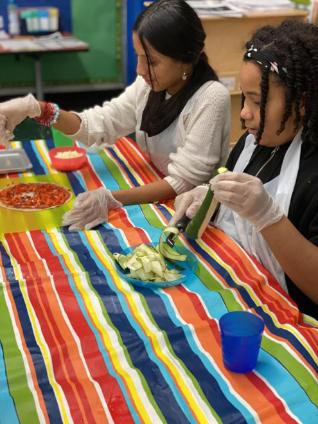The School of Earth, Exploration and Discovery (SEED Harlem) opened the Fall of 2020, facing the additional challenge of operating a new school during a global pandemic. By the school year of 2022-23, SEED has proudly welcomed students to join at all grade levels. Meredith Hill, founding principal of SEED Harlem and Teachers College Alumni, collaborated with Pam Koch, Mary Swartz Rose Associate Professor of Nutrition and Education at Teachers College to bring Arthur Zankel Fellows to the school working on nutrition and gardening projects.
Spring 2021, we partnered with Family Cook Productions to launch an 8-week lunchtime cooking club and afterschool cooking class called “What’s Cooking?” Club. The vision of the space was to help increase self-efficacy among students in choosing real, whole foods that nourish their body. In Fall 2022, we established a lunchtime cooking club in partnership with Cornell University Cooperative Extension. The club provided students with 45-minute nutrition lessons, opportunities to practice their culinary skills, and learn to make positive dietary and behavioral choices.

Additionally, we created an after-school Spanish Culture club in response to the school's request for support in establishing such a club. We incorporated culturally relevant cooking and food lessons, focusing on customs from different Spanish-speaking countries worldwide. The clubs began with students harnessing their kitchen skills to prepare a snack with ingredients from the country of focus that week, primarily local fruits. Additionally, we emphasized the importance of composting food scraps and provided guidance on composting at school, home, and within the community.
Following the successful lunch time cooking club in the fall, we extended partnership with Cornell University Cooperative Extension establishing an after school Garden Kitchen Club. This club provided students with both gardening and cooking lessons. Starting with hands-on garden lessons in an indoor urban setting where students learn to tend to plants, harvest edible plants, and understand the importance of eating local cooking skill; then, transitioned into nutrition-related cooking lessons to prepare healthy and balanced meals. To further engage the school's surrounding community, we collaborated with the organization Harlem Grown to provide two walking field trips to their urban farm. During these trips, students will learn about the farm's history, cultural significance of the ingredients they grow, and its community events. Finally, we are planning an end-of-year cook-off event to celebrate the students' wealth of knowledge from the nutrition, cooking, and gardening classes, with participating students, families, and staff members.
One of the primary challenges was the incorporation of nutrition and gardening lessons into classrooms, which was hindered by limited time available for teaching subjects beyond the core curriculum. Another obstacle was the high turnover rate of administrators, which created uncertainties regarding power hierarchy, policy changes, and scheduling. To overcome these barriers, we worked in lunch time and afterschool spaces and established clubs in collaboration with various organizations; however, this created a time management challenge, especially during lunchtime classes. Additionally, promoting gardening education was challenging due to the scaffolding surrounding the school building, which prevented the construction of an outdoor garden and hindered grant applications that required an outdoor gardening space.
Ultimately, our passion for integrating nutrition education, gardening, and environmental justice led us to work as Zankel Fellows at MS 371 SEED Harlem. We have seen the power of food in uniting students and creating community spaces. Although implementing such programs in a school setting can be challenging due to physical, social, and educational inequities, we adapted and tailored our approach to meet the school's unique needs and leverage its existing strengths.
